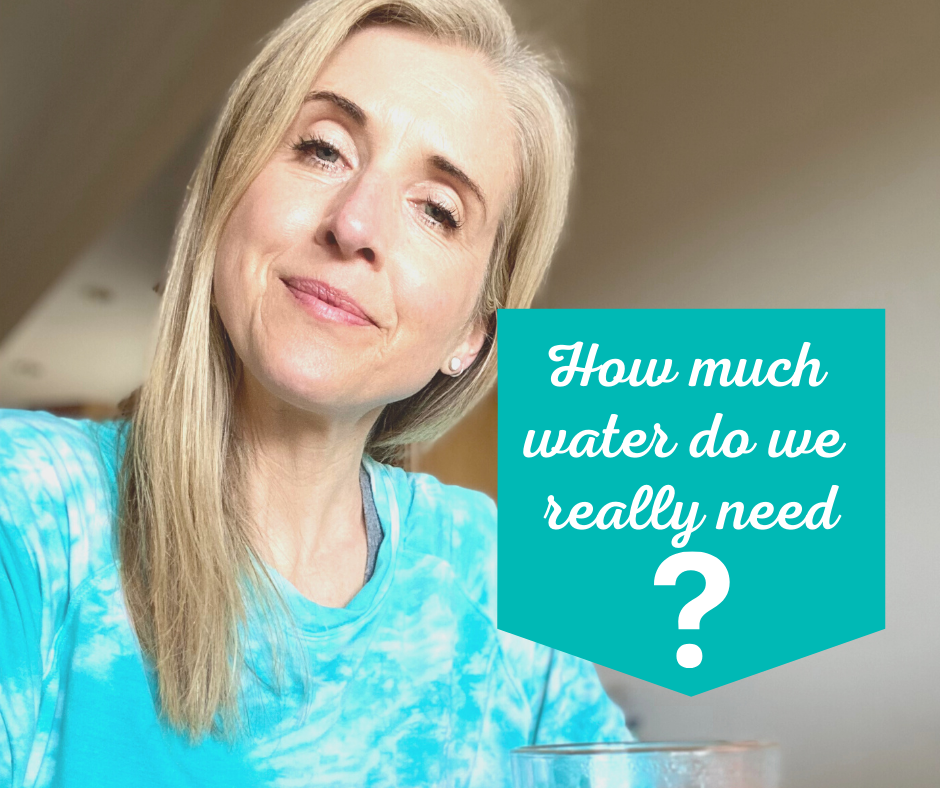How much water do we really need?
How often have you heard the advice, we should ‘aim to drink 8 glasses of water a day’? I think I’ve included this in my new year’s resolution list every year since I was a teenager and spent the rest of each year berating myself because I never seemed to achieve it. Increasingly I’ve come across interviews with medical experts including kidney specialists who have been speaking out against the 8x8 directive, there’s even a hashtag ‘#hydrationbollocks’ doing the rounds. They claim you don’t actually need to drink 8 glasses of water a day to stay hydrated. It’s a myth.
I’m trying to remember when it became a thing and perhaps it was the supermodels who started it – looking fabulous while lugging around giant bottles of water at fashions shows, along with marketing campaigns from bottled water companies and water bottle companies and the oft-repeated 8x8 advice has fuelled our thirst for of optimum hydration.
I asked my mum and my aunt who were teenagers in the ‘60s if they had any memories of living in fear of dehydration, there was a resounding ‘no’, they don’t remember any advice around water intake, apart from sticking it in the kettle for a cuppa. My Mum was wondering if it all kicked off when people started going to gyms – maybe?
In recent years so obsessed are we with hydrating, there has been a rise in the number of cases of hyponatremia (drinking too much water), particularly amongst amateur marathon runners.
It’s not entirely certain where the 8 x 8 advice originally came from – it’s a toss-up between a report from the Food and Nutrition Board of America’s National Research council in 1945 suggesting the body needs one millilitre of water for each calorie of food or nutritionist Frederick J. Stare in the US in the mid ‘70s who recommended an equivalent of 8 x 8oz glasses of water a day to function properly, what his report actually stated though was “For the average adult, somewhere around 6 to 8 glasses per 24 hours and this can be in the form of coffee, tea, milk…fruit and vegetables are also a good source of water." Like Chinese whispers, the message has been distorted.
We don’t need an additional 8 glasses of water on top of everything else we’re taking in – to varying degrees water is in almost everything we eat apart from oils and sugar, and the body is adept at removing fluid from the food and beverages we consume. Based on a regular diet, we actually get around 20% of our daily fluid requirement from our food. For example, milk – full or skimmed – contains around 99% water and as it’s a source of protein too, serves as an excellent post-workout drink.
Contrary to popular belief tea and coffee are not dehydrating – now obviously too much caffeine isn’t good for you and people process it differently, but yes even these beverages contribute to your hydration levels (woohoo!).
According to Prof. Neil Turner, kidney consultant at Edinburgh university, for the regular healthy individual, even the pee colour chart is bunkum. Speaking of pee, Stuart Galloway, professor or exercise physiology of Exeter at the university of Stirling reckons 5-7 times a day is about normal, more than 8 and you’re probably drinking too much.
There are times of course when drinking water may be advised by your medical professional, for example, if someone has had a bout of vomiting/diarrhoea or kidney stones or urinary infections. Also, elderly people may need a reminder to drink.
In his ‘Just One thing’ podcast, Dr. Michael Mosley suggests a glass of water with each meal is sufficient, but for the most part, it seems whoever the marketeer was that came up with the tagline ‘obey your thirst’ was right. Drink when you're thirsty.
And just in case you’ve heard the advice against drinking water with a meal because it affects the digestive juices – again there’s no scientific basis to this either, water aids our digestion.
PS I absolutely admit this is slightly contradicting my previous blog re hydration BUT we learn as we go, in truth I will no doubt continue to sip water while I’m sitting at my laptop and at the gym, but I am going to be more mindful of my thirst and let that direct me.
